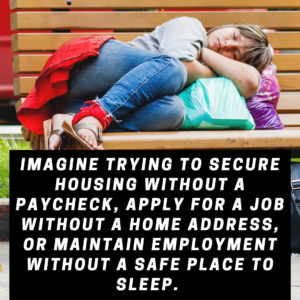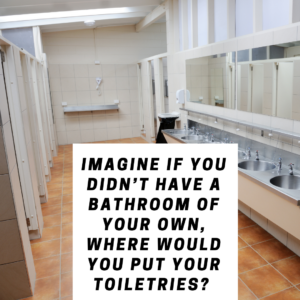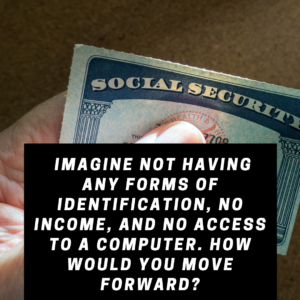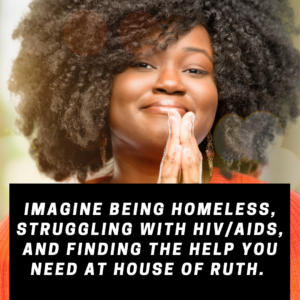There are many reasons why a person may become homeless. Homelessness most commonly results from a lack of affordable housing, unexpected job loss or bills, or mental illness without access to treatment. Once homeless, it’s extremely difficult to free oneself from the cycle.

Imagine trying to secure housing without a paycheck, apply for a job without a home address, or maintain employment without a safe place to sleep.
For nearly thirty years, House of Ruth has worked to find housing and provide supportive services for people living with HIV/AIDS. We operate on the Housing First model, which advocates that a stable place to live is the first step in breaking the cycle of homelessness. In other words, once safe and permanent housing is secured, it’s easier to find employment, access healthcare, begin healing substance use disorders, and so on. House of Ruth works first and foremost to secure stable housing for homeless people and their families affected by HIV/AIDS.
But it doesn’t stop there.
The Housing First model relies on wraparound services that support clients working towards financial and housing stability. The holistic services we provide at House of Ruth help clients overcome the obstacles faced in breaking the cycle of homelessness. Much of what House of Ruth does is simply helping our clients overcome barriers, whatever they may be. Some of these necessary services may surprise you.
Basic Needs

We support clients by fulfilling basic needs whenever possible. House of Ruth’s food pantry is maintained through a partnership with Dare to Care. While most food pantries are accessible once a month, we can provide food for clients once a week. Additionally, community donations grant our clients access to fresh toiletries each month.
Imagine if you didn’t have a bathroom of your own, where would you put your toiletries? If you had to move quickly, what would you choose to leave behind? Many of our clients use this program because toiletries are expensive and difficult to transport and store.
Government-Issued Identification

Another barrier faced by many of our clients is having a valid and current government-issued ID. This is a necessity for many things, like housing applications, visiting federal buildings, receiving SNAP benefits, and more. However, they can be difficult and expensive to obtain. For example, birth certificates can run between $35 and $65 depending on the state of birth. For clients who need it, we will order and pay for a new birth certificate. To ensure our clients don’t misplace their new documents, we can store them at our facility. Many people may not know that you’re only allowed ten replacement social security cards throughout your lifetime, so it’s important to keep them safe.
Where do you store your important documents? Have you ever lost your ID, birth certificate, or social security card? Imagine not having any forms of identification, no income, and no access to a computer. How would you move forward?
Case by Case Support
Much of what we do is supporting our clients on a case-by-case basis, helping them overcome  whatever roadblocks they may have. For example, we have a client who is in permanent housing but is illiterate. Once a month, this client brings a stack of mail to sort alongside House of Ruth staff. We identify what’s important and what can be tossed. We also address and send out a money order for his rent each month so that his rent is never late. About 21% of Americans have low literacy skills, with millions of people considered functionally illiterate.
whatever roadblocks they may have. For example, we have a client who is in permanent housing but is illiterate. Once a month, this client brings a stack of mail to sort alongside House of Ruth staff. We identify what’s important and what can be tossed. We also address and send out a money order for his rent each month so that his rent is never late. About 21% of Americans have low literacy skills, with millions of people considered functionally illiterate.
Imagine not being able to decipher a bill or important notice. How would you avoid past-due payments, piling late fees, or eviction?
Being There
For some of our clients, House of Ruth (and other supportive agencies) are the only positive encouragement that they have. Typically, when someone is diagnosed with cancer or heart disease, they don’t get kicked out of their home or maligned because of their illness. Unfortunately, that is the case for many of our clients because of their HIV status.
For that reason, many of our clients don’t have anyone in their lives to whom they can turn. Imagine not having anyone to go with you to a scary medical appointment. Imagine moving to a new home, but not knowing anyone who can rent a truck and help you move your belongings.

Some clients simply don’t tell family or friends about their diagnosis. In instances like this, case managers and doctors are the only people they can talk to about their illness. Imagine having a serious disease and feeling completely alone.
Recently, we received a call from Hosparus Inpatient Care Center. One of our clients was beginning the transition process and would most likely pass in the next couple of days. This client did not have any family, and House of Ruth was the only emergency contact listed on his medical records. Imagine approaching the end of your life with no one by your side. Unfortunately, it is not uncommon for a client to pass away without anyone to provide funeral or cremation services.
These are just some of the ways that House of Ruth supports people with HIV/AIDS and their families who are homeless, at risk of losing their homes, or need financial help. Our work can be heartbreaking, but it is often hopeful. Our case managers are here for our clients to help them navigate life as they get on their feet, empowering them to get or maintain housing and become financially self-sufficient.
Imagine being homeless, struggling with HIV/AIDs, and finding the help you need at House of Ruth.
You can BE THERE for our clients. Donate to House of Ruth today.
You can learn more about our mission and services by visiting us online at HouseofRuth.net, and by following us on social media: Instagram: @houseofruthlou Facebook: @HouseOfRuthLouisville
There are many reasons why a person may become homeless. Homelessness most commonly results from a lack of affordable housing, unexpected job loss or bills, or mental illness without access to treatment. Once homeless, it’s extremely difficult to free oneself from the cycle.

Imagine trying to secure housing without a paycheck, apply for a job without a home address, or maintain employment without a safe place to sleep.
For nearly thirty years, House of Ruth has worked to find housing and provide supportive services for people living with HIV/AIDS. We operate on the Housing First model, which advocates that a stable place to live is the first step in breaking the cycle of homelessness. In other words, once safe and permanent housing is secured, it’s easier to find employment, access healthcare, begin healing substance use disorders, and so on. House of Ruth works first and foremost to secure stable housing for homeless people and their families affected by HIV/AIDS.
But it doesn’t stop there.
The Housing First model relies on wraparound services that support clients working towards financial and housing stability. The holistic services we provide at House of Ruth help clients overcome the obstacles faced in breaking the cycle of homelessness. Much of what House of Ruth does is simply helping our clients overcome barriers, whatever they may be. Some of these necessary services may surprise you.
Basic Needs

We support clients by fulfilling basic needs whenever possible. House of Ruth’s food pantry is maintained through a partnership with Dare to Care. While most food pantries are accessible once a month, we can provide food for clients once a week. Additionally, community donations grant our clients access to fresh toiletries each month.
Imagine if you didn’t have a bathroom of your own, where would you put your toiletries? If you had to move quickly, what would you choose to leave behind? Many of our clients use this program because toiletries are expensive and difficult to transport and store.
Government-Issued Identification

Another barrier faced by many of our clients is having a valid and current government-issued ID. This is a necessity for many things, like housing applications, visiting federal buildings, receiving SNAP benefits, and more. However, they can be difficult and expensive to obtain. For example, birth certificates can run between $35 and $65 depending on the state of birth. For clients who need it, we will order and pay for a new birth certificate. To ensure our clients don’t misplace their new documents, we can store them at our facility. Many people may not know that you’re only allowed ten replacement social security cards throughout your lifetime, so it’s important to keep them safe.
Where do you store your important documents? Have you ever lost your ID, birth certificate, or social security card? Imagine not having any forms of identification, no income, and no access to a computer. How would you move forward?
Case by Case Support
Much of what we do is supporting our clients on a case-by-case basis, helping them overcome  whatever roadblocks they may have. For example, we have a client who is in permanent housing but is illiterate. Once a month, this client brings a stack of mail to sort alongside House of Ruth staff. We identify what’s important and what can be tossed. We also address and send out a money order for his rent each month so that his rent is never late. About 21% of Americans have low literacy skills, with millions of people considered functionally illiterate.
whatever roadblocks they may have. For example, we have a client who is in permanent housing but is illiterate. Once a month, this client brings a stack of mail to sort alongside House of Ruth staff. We identify what’s important and what can be tossed. We also address and send out a money order for his rent each month so that his rent is never late. About 21% of Americans have low literacy skills, with millions of people considered functionally illiterate.
Imagine not being able to decipher a bill or important notice. How would you avoid past-due payments, piling late fees, or eviction?
Being There
For some of our clients, House of Ruth (and other supportive agencies) are the only positive encouragement that they have. Typically, when someone is diagnosed with cancer or heart disease, they don’t get kicked out of their home or maligned because of their illness. Unfortunately, that is the case for many of our clients because of their HIV status.
For that reason, many of our clients don’t have anyone in their lives to whom they can turn. Imagine not having anyone to go with you to a scary medical appointment. Imagine moving to a new home, but not knowing anyone who can rent a truck and help you move your belongings.

Some clients simply don’t tell family or friends about their diagnosis. In instances like this, case managers and doctors are the only people they can talk to about their illness. Imagine having a serious disease and feeling completely alone.
Recently, we received a call from Hosparus Inpatient Care Center. One of our clients was beginning the transition process and would most likely pass in the next couple of days. This client did not have any family, and House of Ruth was the only emergency contact listed on his medical records. Imagine approaching the end of your life with no one by your side. Unfortunately, it is not uncommon for a client to pass away without anyone to provide funeral or cremation services.
These are just some of the ways that House of Ruth supports people with HIV/AIDS and their families who are homeless, at risk of losing their homes, or need financial help. Our work can be heartbreaking, but it is often hopeful. Our case managers are here for our clients to help them navigate life as they get on their feet, empowering them to get or maintain housing and become financially self-sufficient.
Imagine being homeless, struggling with HIV/AIDs, and finding the help you need at House of Ruth.
You can BE THERE for our clients. Donate to House of Ruth today.
You can learn more about our mission and services by visiting us online at HouseofRuth.net, and by following us on social media: Instagram: @houseofruthlou Facebook: @HouseOfRuthLouisville

